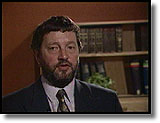
|
Government Names Failing SchoolsTeams of expert headmasters and teachers are to be sent into eighteen English schools identified as "failing" schools by the Government. The schools have been warned they are letting down their pupils and must do better.The blunt message was part of a twin-track policy of pressure and support, announced by the Government today to raise education standards. It was delivered to "failing" schools which have not improved despite up to two years of emergency measures imposed by the last Government. The new policy, unveiled today by Education Secretary David Blunkett, deliberately avoids the use of "hit squads" - used only once by the last Government to take a failing school out of the hands of its local authority. The schools named will remain under the control of their authorities, or governors in the case of those which are grant maintained. For a picture aligned to left:
He responded directly to criticism from teaching unions, who have warned that "public humiliation" of schools is no way to improve their performance and will only further demoralise staff. "The decision to name these schools has not been taken lightly, but persistent failure will not be tolerated by this Government in any one of the 25,000 schools in this country," said Mr Blunkett. "There is no easy way or turning round a failing school. However, I want to see schools and education authorities taking responsibility for raising standards and clearly demonstrating that everything that can be done is being done," he said. The initial reaction from teaching unions today was hostile. Doug McAvoy, general secretary of the biggest teaching union the National Union of Teachers, said "naming and shaming" schools was not the way forward".
"Teachers at these schools already feel demoralised," he said. Publishing a "list of shame" would only make that worse. He called for a "strategy for improvement which addresses their individual problems". And Nigel de Gruchy, general secretary of the National Union of Schoolmasters Union of Women Teachers, said: "I fail to see how naming and shaming will help. "We had enough of public humiliation from the previous Conservative government," he said. "The new Labour Government will soon discover that these problems cannot be resolved by distant diktat." But the Local Government Association, representing education authorities, welcomed the new "partnership" with the Government to tackle failing schools. In a statement today, LGA education chairman Graham Lane said: "Authorities stand ready to work with government to improve standards in these schools. Identifying the reasons is crucial and taking the necessary action is the next step."
|
Diana, Princess of Wales, 1961-1997
Conference 97
Devolution
The Archive
News |
Issues |
Background |
Parties |
Analysis |
TV/Radio/Web
Interactive |
Forum |
Live |
About This Site
News |
Issues |
Background |
Parties |
Analysis |
TV/Radio/Web
Interactive |
Forum |
Live |
About This Site
© BBC 1997 |
politics97@bbc.co.uk |

